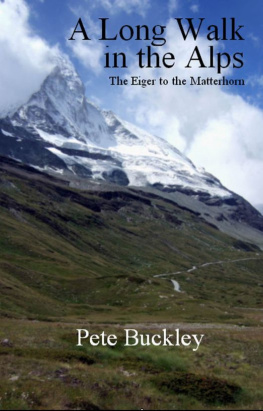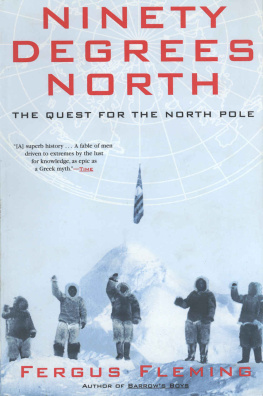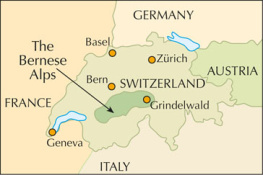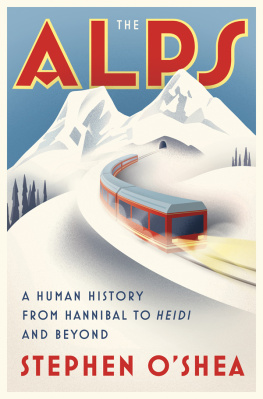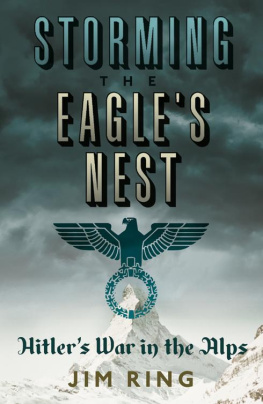Killing Dragons
Also by Fergus Fleming
Barrows Boys
Killing Dragons

The Conquest of the Alps
FERGUS FLEMING

Copyright 2000 by Fergus Fleming
All rights reserved. No part of this book may be reproduced in any form or by any electronic or mechanical means, including information storage and retrieval systems, without permission in writing from the publisher, except by a reviewer, who may quote brief passages in a review. Any members of educational institutions wishing to photocopy part or all of the work for classroom use, or publishers who would like to obtain permission to include the work in an anthology, should send their inquiries to Grove/Atlantic, Inc., 841 Broadway, New York, NY 10003.
First published in Great Britain in 2000 by Granta Books, London, England
Published simultaneously in Canada
Printed in the United States of America
Library of Congress Cataloging-in-Publication Data
Fleming, Fergus, 1959
Killing dragons: the conquest of the Alps / Fergus Fleming.
p. cm.
Includes bibliographical references.
eBook ISBN-13: 978-0-8021-9754-2
1. MountaineeringAlpsHistory19th century. 2. Mountaineers
Biography. 3. AlpsDescription and travel. I. Title.
DQ823. F613 2000
914.947dc21
00-04335
Grove Press
841 Broadway
New York, NY 10003
PREFACE AND ACKNOWLEDGEMENTS

Any account of the Alps must lead sooner or later to the events of July 1865. In that month an obscure printer named Edward Whymper became Europes most talked-about man. The reason? He had climbed the Matterhorn, one of the worlds legendary mountains and one of the last to be conquered in the Alps. But he had earned his glory at a horrible cost. A rope snapped during the descent and four of his seven-strong team fell to their deaths. Portions sufficient to fill three coffins were later retrieved. Of the fourth man - a Lord, no less - nothing was found save a shoe, a pair of gloves and a coat sleeve. A Reuters report gave the full, stomach-turning details but was swiftly suppressed. (And has been ever since: it now exists only as a yellowing document in the archives of the Alpine Club.) Rumours of its content, however, were enough to make people gawp. Here, for the first time, and in truly dramatic fashion, were revealed the perils and triumphs of mountaineering.
The Matterhorn disaster was one of those tragic events of which the Victorians were so fond and to which they were so prone. It ranked in popular imagination alongside Franklins disappearance in the Arctic, Livingstones death in Africa and, later, Scotts fate at the South Pole. It shaped the childhood perceptions of millions - amongst them Winston Churchill - and it had, uniquely, a survivor who could describe it at first hand. Edward Whymper, who was only in his mid-twenties at the time of the disaster, was bedevilled by it for the rest of his life. He loomed in popular imagination as a Titan and as he aged he came to look the part. Pipe in hand, his mouth set in a perpetual scowl, he delivered the same harsh lecture to audiences of thousands almost until the year he died. As an extraordinary man - and an extraordinarily odd one, too - Whymper could fill a book on his own. (He has done so: three of them.) So long is his shadow that even today he is the first person one associates with the Alps. His notoriety, however, is obstructive. Set in context Whymper becomes a memorable, but by no means the most important, character in a long history of Alpine exploration.
When one thinks of exploration one thinks primarily in terms of the poles and Africa, of ice caps and deserts, of furs and snake boots. Distance is paramount, foreignness all. Yet here, in the middle of the worlds smallest, most densely populated continent, was a wilderness which was not properly mapped until the late nineteenth century and whose more inaccessible slopes are still being fought over today. The Alps lacked the sullen gravitas of the Arctic or the dry weirdness of the Sahara but they had the same aura of inaccessibility. Their higher zones were unknown and around them had been woven a web of myth and superstition. In the eighteenth century a respected scientist quite seriously enumerated the different species of dragon to be found there. For a long while people believed that the peaks were home to an alien race - and why not? They did not even know if humans could survive at such altitudes. It was a closed world. Whymper, and people like him, felt compelled to open it.
Exploration conjures up images of obsessive men - typically British - doing mad things in strange surroundings. The Alpine explorers were no different. Always fixated and sometimes peculiar, they shared a background of illness and phobia: sickly childhoods were ubiquitous; insomnia and indigestion were common; one man was afraid of heights, another of garlic. They had spiritual problems, being uncertain whether the Alps would lead them to God or confirm his non-existence. And yes, a lot of them were British. Then again, a lot of them were not. The Swiss, French, Germans and Italians were equally prone to arguments and insanity; they quibbled as pointlessly and displayed the same eccentricities. And while it is true that Britons made their mark - in particular members of the Alpine Club - their continental rivals were no less active. Were it not for one Genevans politeness to a M. Dolomieu, for example, the Dolomites would now be known as the Saussures.
The Alps caused controversy when they were being explored and they continue to do so today. Everybody has a favourite region, a favourite mountain, a specialised area of interest, a unique appreciation of the peaks beauties, an interpretation of their past and a vision of their future. Anything written on the subject raises bubbles of partisan outrage. It is with some trepidation, therefore, that I add this book to the cauldron. Those who know the Alps like the back of their hands, or who have a particular speciality, will doubtless smite me for a thousand heresies of omission or misdescription. To all these people I apologise. What I have tried to do is tell a tale of exploration in the simplest meaning of the word - of going where no man has gone before.
The subtitle, The Conquest of the Alps, is selective. I have narrowed the term Alps to describe the central, western section running from the Massif des crins (or the Dauphin, as it was previously called) through the Mont Blanc range to the Bernese Oberland and then south to the Valais. I have done so because these are among the highest and most impressive mountains and they were the ones people most wanted to explore. Their Conquest has been similarly reduced. Diehard mountaineers claim that the conquest is ongoing and that there are many new routes and faces yet to be conquered. Here, however, the conquest is interpreted as the first ascent of major peaks, the ground-breaking investigation of glaciers and, because it represents the new wave of exploration (also because it is too good a story to miss out), the battle for the Eigerwand. As for those who did the conquering, self-censorship again prevails. Many fine explorers have been omitted, such as Father Placidus a Spescha, who roamed bravely through the eastern Alps; the Abb Imseng, renowned for his ability to go up mountains and for the greasy cassock in which he did so; and Charles Barrington, the prize-winning Irish jockey, who climbed the Eiger on his winnings and a whim during his one and only visit to the Alps. The disastrous career of Francis Fox Tuckett, who was twice arrested as a spy and who survived so many avalanches, rockfalls and lightning strikes that it beggars belief, has barely been touched upon. One has to draw the line somewhere.
Next page








